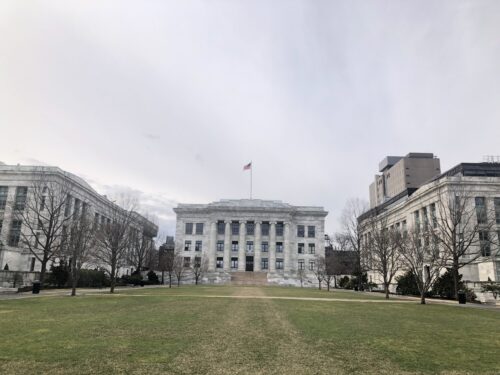With the shift to virtual learning and working from home, many Americans are sleeping quite differently than they did before the pandemic. For Harvard students, this means no more 6:00 a.m alarms for sports practice; no more late-night study sessions in Lamont. No more walks to the dining hall to grab a bite before class, and no more coffee meet-ups crammed into the 15 minutes between classes. Quite the transformation in quotidien life.
On one hand, it’s a great thing: without early morning commutes and jam-packed schedules, we’re sleeping later. But on the other hand, the pandemic has disrupted the quality of our sleep: bedrooms have turned into work spaces, and coronavirus-related anxiety has left people tossing and turning into the late hours of the night.
How do we reconcile these various phenomena? And why is it important to get good sleep, especially right now? Sleep specialists offer some insight.
“The lockdown environment, shorter commutes and fewer social obligations may have resulted in more available time for sleep and more consistent sleep schedules across the typical week,” shares Dr. Rebecca Robbins, a postdoctoral fellow at the Brigham and Women’s Hospital and Harvard Medical School.
She points to a study in Current Biology which analyzed sleep among university students before and after the WHO declared COVID-19 a pandemic. Led by Ken Wright and colleagues, the study looked at the time people spent in bed devoted to sleep each night, a proxy for sleep duration. During lockdown, this figure increased by roughly 30 minutes on school nights and roughly 24 minutes on weekends. In addition, the difference between weekend and weekday sleep timing decreased, as college students reported later sleep onset and wake times by about 50 minutes during school nights and about 25 minutes on weekends.
These findings suggest “an overwhelmingly positive outcome among young people,” Dr. Robbins says, “for home school and weekend sleep times are often dramatically different.”
Research from the Atlantic supports these conclusions about increased sleep duration, highlighting improvements in teenagers’ sleep schedules. In 2018, only 55 percent of teens said they typically slept seven or more hours a night, writes psychologist Jean M. Twenge. During lockdown, this figure reached 84 percent for teens whose schools were still in session. Why?
When classes are held in person, the vast majority of students must be at their desk by 8:30 a.m., even by 7 a.m. at some schools. “This creates a mismatch between school schedules and the shift to a later circadian rhythm that occurs during biological puberty, when teens find it difficult to fall asleep earlier,” explains Twenge.
In contrast, online school allows teenagers to wake up later in the morning and achieve crucial hours of sleep. In fact, “teens who were able to sleep later during the early months of the pandemic might have improved their mental health,” Twenge suggests.
However, the pandemic has not been an entirely positive influence on our sleep. Indeed, copious stressors in our lives and in the world around us threaten our ability to rest well.
“Many are without work which poses a substantial amount of stress,” Dr. Robbins explains. Financial strain adds to other pressures: children are home and many parents are working from home, even from their bedrooms, where sleep experts caution us to avoid using electronics. In addition, anxiety-provoking news constantly flows from our phones, which emit blue light that keeps us even more awake.
The science confirms it: a recent study by Dr. Blume and colleagues found a reduction in sleep quality among adults residing in three European countries. Chandra L. Jackson, Ph.D., a research investigator with the National Institute of Environmental Health Sciences, concurs: many people are achieving a lower quality of sleep than before the pandemic. And even when people are sleeping longer than they need to, they may “feel groggy, unfocused, and even irritable throughout the day,” Jackson says.
The rise in sleeping difficulties is especially troubling for our immune systems. Poor sleep interferes with disease-fighting proteins called cytokines, thus damaging the immune system’s defense mechanisms. Those suffering from sleep deficiency are consequently less capable of fighting infections, like the novel coronavirus that causes COVID-19.
In addition, poor sleep correlates with an increased risk of various health issues, such as cancer, cardiovascular disease, diabetes, and obesity. Those afflicted with these ailments are more susceptible to complications with coronavirus, should they contract it.
“It’s important to work on optimizing you and your family’s sleep—especially now,” advises Michael Twery, Ph.D., director of the NHLBI’s National Center on Sleep Disorders Research, in an article for the NIH. “Getting a good night’s sleep during the pandemic helps boost the immune system and should be an important part of your daily routine, along with healthy eating and staying physically active,” Twery says.
How can we rest well in a pandemic? There are many different solutions, such as removing electronics from the bedroom and normalizing napping as a ritual not just for children, but for adults, too. Dr. Robbins shares one of her tricks: to maintain consistency and structure in her sleep schedule, she “commit[s] to getting up after the first alarm and making my bed as soon as possible to resist the urge to stay in bed.”
Dr. Robbins looks to future sleep studies for guidance. “Hopefully research will explore some of these issues, such as those for whom sleep is harder,” she says. Research may also illuminate “methods for helping these groups mitigate modifiable factors such as stress and worry relating to the pandemic.” In other words, the more we know about what’s keeping us awake, the more we can enhance our quality of sleep. That way, we can rest better, and rest easy, knowing that we’re getting the sleep we need to stay strong in the midst of a pandemic.
Mary Julia Koch ‘23 (mkoch@college.harvard.edu) writes News for the Independent.
Photo courtesy of Marissa Garcia ’21.

